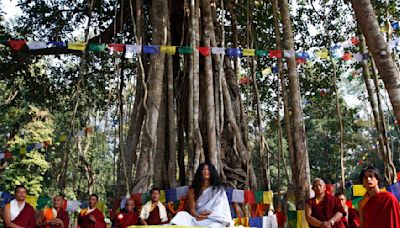Search results
Siddhartha Gautama, [e] most commonly referred to as the Buddha ('the awakened'), [f] [g] was a wandering ascetic and religious teacher who lived in South Asia during the 6th or 5th century BCE [4] [5] [6] [c] and founded Buddhism.
Oct 12, 2017 · Buddhism is a religion that was founded by Siddhartha Gautama (“The Buddha”) more than 2,500 years ago in India. With about 470 million followers, scholars consider Buddhism one of the major ...
Buddhism (/ ˈ b ʊ d ɪ z əm / BUUD-ih-zəm, US also / ˈ b uː d-/ BOOD-), also known as Buddha Dharma and Dharmavinaya, is an Indian religion and philosophical tradition based on teachings attributed to the Buddha.
6 days ago · June 25, 2024, 10:33 AM ET (AP) Nepalese spiritual leader ‘Buddha Boy’ convicted of sexual assault on minor. Buddha (born c. 6th–4th century bce, Lumbini, near Kapilavastu, Shakya republic, Kosala kingdom [now in Nepal]—died, Kusinara, Malla republic, Magadha kingdom [now Kasia, India]) was the founder of Buddhism, one of the major ...
Gautama Buddha, also known as Shakyamuni Buddha, or simply the Buddha, was an Indian sage on whose teachings Buddhism was founded. He is believed to have lived and taught in northeastern India sometime between the sixth and fourth centuries BCE.
6 days ago · Buddhism, religion and philosophy that developed from the doctrines of the Buddha, a teacher who lived in northern India between the mid-6th and mid-4th centuries BCE. Buddhism has played a central role in the spiritual, cultural, and social life of Asia, and, beginning in the 20th century, it spread to the West.
6 days ago · Buddhism - Enlightenment, Dharma, Four Noble Truths: The teacher known as the Buddha lived in northern India sometime between the mid-6th and the mid-4th centuries before the Common Era. In ancient India the title buddha referred to an enlightened being who has awakened from the sleep of ignorance and achieved freedom from suffering.
Feb 17, 2011 · Buddha. The Buddha (fl. circa 450 BCE) is the individual whose teachings form the basis of the Buddhist tradition. These teachings, preserved in texts known as the Nikāyas or Āgamas , concern the quest for liberation from suffering.
The life story of the Buddha begins in Lumbini, near the border of Nepal and India, about 2,600 years ago, where the man Siddharta Gautama was born. Although born a prince, he realized that conditioned experiences could not provide lasting happiness or protection from suffering.
Jul 3, 2019 · Siddhartha is a Sanskrit name meaning "one who has accomplished a goal," and Gautama is a family name. His father, King Suddhodana, was the leader of a large clan called the Shakya (or Sakya). It's not clear from the earliest texts whether he was a hereditary king or more of a tribal chief.



